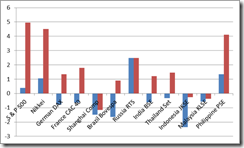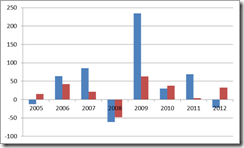Government operation to free hostages ensnared by an al-Qaeda-linked group in a natural gas plant in a remote area in Southeastern Algeria apparently ended up in a fiasco: most hostages were slain along with their captors.(Bloomberg)
Historian Eric Margolis at the LewRockwell.com sheds us insightful historical compendium of the recent revival of the political turmoil at West Africa.
I categorized his essay into different headings
1. Not an endemic Islam Story
Western governments and media have done the public a major disservice by trumpeting warnings of an "Islamist threat" in Mali. It’s as if Osama bin Laden has popped up on the Niger River. Our newest crisis in Africa is not driven primarily by religion but by a spreading uprising against profoundly corrupt, western-backed oligarchic governments and endemic poverty.
2. The Repercussions of Libya War and the French Client States
Mali’s troubles began last year when it shaky government was overthrown. Meanwhile, heavily-armed nomadic Tuareg tribesmen, who had served Libya’s late Col. Gadaffi as mercenaries until he was overthrown by French and US intervention, poured back into their homeland in Mali’s north. A major unexpected consequence. Fierce Tuareg warriors, who battled French colonial rule for over a century, were fighting for an independent homeland, known as Azawad.They, a small, violent jihadist group, Ansar Din, and another handful of obscure Islamists drove central government troops out of the north, which they proclaimed independent, and began marching on the fly-blown capital, Bamako.France, the colonial ruler of most of West Africa until 1960, has overthrown and imposed client regimes there ever since. French political, financial and military advisors and intelligence services ran West Africa from behind a façade of supposedly independent governments. Disobedient regimes were quickly booted out by elite French troops and Foreign Legionnaires based in West Africa that guarded France’s mining and oil interests in what was known as "FrancAfrique."
3. Contagion and Diversion from Domestic Political-Economic Affairs.
Overthrowing African regimes was OK for France, but not for locals. When Mali’s French-backed regime was challenged, France feared its other West African clients might face similar fate, and began sending troops to back the Bamako regime. President Francois Hollande, who had vowed only weeks ago not to intervene in West Africa, said some 2,500 French troops would intervene in Mali. But only on a "temporary basis" claimed Hollande, forgetting de la Rochfoucauld’s dictum "there is nothing as permanent as the temporary!"Other shaky western-backed West African governments took fright at events in Mali, fearing they too might face overthrow at the hands of angry Islamists calling for stern justice and an end to corruption. Nigeria, the region’s big power, vowed to send troops to Mali. Nigeria has been beset by its own revolutionary jihadist movement, Boko Haram, which claims Muslim Nigerians have been denied a fair share of the nation’s vast oil wealth, most of which has been stolen by corrupt officials.France’s overheated claim that it faces a dire Islamic threat in obscure Mali could attract the attention of numbers of free-lance jihadists, many who are now busy tearing up Syria. Paris was better off when it claimed its troops were to protect ancient Muslim shrines in Timbuktu. Or it could have quietly sent in the Foreign Legion, as in the past.Instead, Mali has become a crisis with the US, Britain, West African states and the UN involved in this tempest in an African teapot. A nice diversion from budget crisis.
4. Hostage taking in Algeria and the Expansion of the Theater of War by Interventionists.
Another Algerian jihadist group just attacked an important state gas installation in revenge for France’s assault on Mali. This bloody action has awoken Algeria’s hitherto quiescent Islamic resistance groups. They waged a ten year war against Algeria’s US and French backed military regime, one of the continent’s most repressive regimes, after Algeria’s armed forces crushed Islamists after they won a fair election in 1991.Over 250,000 Algerians died in a long, bloody civil war. The Algiers government often used gangs of its soldiers disguised as rebel fighters to commit gruesome massacres to blacken the name of the opposition. Algeria may again be headed for a new bloodbath, this time with minority Berber people calling for their independent state.US air forces and small numbers of Special Forces from its new Africa Command are now entering action in Mali and Algeria. More are sure to follow as West Africa smolders
My comments
As diversionary ploy to distract the public’s attention, wars has usually been the recourse of economically strained nations to drum up political support (via nationalism), as well as, to “suppress dissension among members of the productive class” (Salerno)
Wars has been typically used as justification for further inflationism and for expansionary government or the “opportunity to intensify economic exploitation” (Salerno)
Wars have been used to promote the financial and political interests of vested interested groups represented by military industrial complex “the acquisition of unwarranted influence, whether sought or unsought, by the military industrial complex” (President Eisenhower), as well as, the neoconservative cabal through the ideological role of “global policeman” which formerly had been based on “global struggle against communism” (Gordon) and neocon goals of “continuing privileged hierarchical rule, and to continue to worship the nation-state and its war-making machine” (Rothbard).
Most likely today’s imperial foreign policies as evidenced by West Africa’s conflicts signify as cauldron of the factors above.





